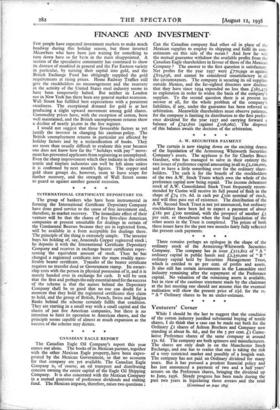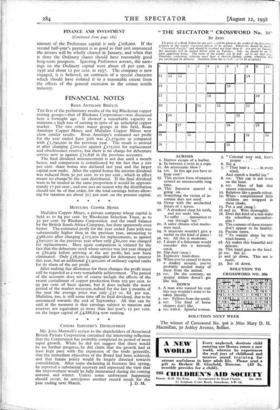FINANCE AND INVESTMENT-
FEW people have expected investment markets to make much headway during this holiday season, but those inverted Micawbers who have been just waiting for something to turn down have so far te=n in the main disappointed. A section of the speculative community has continued to show its distrust of mankind in general and the Far Eastern variety in particular, by turning their capital into gold, and the British Exchange Fund has obligingly supplied the gold requirements at rising prices. Home Railway Traffics still give the stockholders no encouragement and the recovery in the activity of the United States steel industry seems to have been temporarily halted. But neither in London nor in New York has there been any general market recession. Wall Street has fulfilled best expectations with a persistent steadiness. The exceptional demand for gold is at last producing a slight upward movement among gold shares. Commodity prices have, with the exception of cotton, been well maintained, and the British unemployment returns show a decline of nearly 30,000 in the live register.
I would not suggest that these favourable factors as yet justify the investor in changing his cautious policy. The British unemployment returns in particular are affected by holiday factors and by a reclassification of books. They are more than usually difficult to evaluate this year because one does not know how far the " holidays with pay " move- ment has prevented applicants from registering as unemployed. Even the sharp improvement which they indicate in the cotton textile and tinplate industries can well be left alone unless it is confirmed by next month's figures. The copper and gold share groups do, however, seem to leave scope for further recovery, and the strength of Wall Street seems to guard us against another general recession.
* * * * INTERNATIONAL CERTIFICATE DEPOSITARY CO.
The group of bankers who have been instrumental in forming the International Certificate Depositary Company have done good service to the cause of free investment and, therefore, to market recovery. The immediate effect of their venture will be that the shares of five first-class American companies at present unsuitable for dealings in certain of the Continental Bourses because they are in registered form, will be available in a form acceptable for dealings there. The principle of the thing is extremely simple. The investor buys his holding of, say, Anaconda Copper registered stock ; he deposits it with the International Certificate Depositary Company and receives in exchange bearer certificates repre- senting the equivalent amount of stock. Thus he has changed a registered certificate into the more readily _trans- ferable bearer certificate. Transfer of the bearer certificate requires no transfer deed or Government stamp. Its owner- ship rests with the person in physical possession of it, and it is merely handed over in exchange for cash. It will be seen that the first and perhaps the only essential need for the success of the scheme is that the names behind the Depositary Company shall be so good that no one can doubt for a moment that they hold the registered certificates tliey claim to hold, and the group of British, French, Swiss and Belgian Banks behind the scheme certainly fulfils that condition. They are starting in a small way with a small capital and the shares of just five American companies, but there is no intention to limit its operation to American shares, and the principle seems capable of almost as much expansion as the success of the scheme may dictate.
CANADIAN EAGLE REPORT
The Canadian Eagle Oil Company's report this year comes out alone. The books of its Mexican partner, together with the other Mexican Eagle property, have been expro- priated by the Mexican Government, so that no accounts for that company are yet available. The Canadian Eagle Company is, of course, an oil transport and distributing concern owning the entire capital of the Eagle Oil Shipping Company. It is also concerned with the Mexican Company in a mutual guarantee of preference dividends and sinking fund. The Mexican impasse, therefore, raises two questions : Can the Canadian company find other oil in place of the Mexican supplies to employ its shipping and fulfil its com- mitments on this side of the ocean ? And how far will the mutual guarantee withdraw the available profits from the Canadian Eagle shareholders in favour of those of the Mexican Company ? The answer to the first question is satisfactory. Net profits for the year 1937 were £770,949 as against £819,036, and cannot be considered unsatisfactory in all the circumstances. The company is securing its oil supplies outside Mexico, and the far-sighted directors now disclose that they have since 1934 expended no less than £585,475 in exploration in order to widen the basis of the company's supplies. To the second question there is at present no answer at all, for the whole problem of the company's liabilities, if any, under the guarantee has been referred to arbitration. Meanwhile shareholders must observe patience, for the company is limiting its distribution to the first prefer- ence dividend for the year 1937 and carrying forward a balance of £741,650 (against £108,062). The disposal of this balance awaits the decision of the arbitration.
* * * * A. W. SECURITIES PAYMENT
The curtain is now ringing down on the exciting drama of the liquidation of the Armstrong Whitworth Securities Company's assets. The applause is for Sir Charles Bruce Gardner, who has managed to salve in their entirety the two issues of preference capital amounting in all to L2,100,000, and to have a little something over for the ordinary share- holders. The cash is for the benefit of the stockholders of the two A.W. Stock Trusts which own the whole of the preference capital now being repaid. The income debenture stock of A.W. Consolidated Stock Trust frequently recom- mended by Custos will receive its full pound of flesh in the shape of £74 17s. 6d. in cash per f roo nominal of stock, and will thus pass out of existence. The distribution of the A.W. Second Stock Trust is not yet announced, but ordinary stockholders have been led to expect a payment of about £182 per Do° nominal, with the prospect of another £5 per cent. or thereabouts when the final liquidation of the other assets in the Trust is completed. The prices of both these issues have for the past two months fairly fully reflected the present cash payments.
* * * * There remains perhaps an epilogue in the shape of the ordinary stock of the Armstrong-Whitworth Securities Company. The company has in issue £512,812 of " A " ordinary capital in public hands and £2,350,000 of " B " ordinary capital held by Securities Management Trust, which is entitled to 90 per cent. of profits and assets. It also still has certain investments in the Lancashire steel industry remaining after the repayment of the Preference capital. No valuation of the remaining assets is available, but in view of the cautious statement made by the chairman at the last meeting one should not assume that the eventual realisation will show the present price of lid. for the Is. " A " Ordinary shares to be an under-estimate.
* * * *
Venturers' Corner
While I should be the last to suggest that the condition of the cotton industry justified substantial buying of textile shares, I do think that a case can be made out both for the Ordinary LI shares of Ashton Brothers and Company now standing at about 8s. 6d., and for the 5 per cent. Li Cumu- lative Preference shares of the same company at around 13s. 6d. The company are both spinners and manufacturers. The shares are only dealt in on the Manchester Stock Exchange, and one has to realise that one is taking the risk of a very restricted market and possibly of a longish wait. The company has not paid an Ordinary dividend for many years. But it has pursued a prudent financial policy and has just announced a payment of two and a half years' arrears on the Preference shares, bringing the dividend up to June, 1936. Steady progress has been made during the past two years in liquidating those arrears and the total
(Continued on page 284)
FINANCE AND INVESTMENT (Continued from page 282) amount of the Preference capital is only £1o8,000. If the' second half-year's payment is as good as that just announced the arrears will be wholly cleared in January, and when that is done the Ordinary shares should have reasonably good long-term prospects. Ignoring Preference arrears, the earn- ings on the Ordinary capital were about 18 per cent. in 1936 and about 12 per cent. in 1937. The company is now engaged, it is believed, on contracts of a special character which should have isolated it to a reasonable extent from the effects of the general recession in the cotton textile industry.







































 Previous page
Previous page